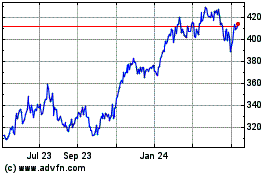Amazon Partners With VMware to Extend Its Computing Cloud
October 13 2016 - 8:50PM
Dow Jones News
Amazon.com Inc.'s cloud-computing unit signed a deal with VMware
Inc. to offer companies the ability to run their computing
operations on both their own VMware-equipped data centers and
Amazon's web-based servers.
The deal bolsters the retailer in its competition against cloud
providers including Alphabet Inc.'s Google, International Business
Machines Corp., and Microsoft Corp. It is a big step for Amazon Web
Services, which started out catering to startups that had little or
no on-premises operations but increasingly serves corporate clients
that have their own data centers.
Amazon and VMware on Thursday announced a service for so-called
hybrid-cloud deployments, applications that run partly on a
customer's private servers and partly in publicly available cloud
data centers. The service, called VMware Cloud on AWS, lets VMware
customers take advantage of the cloud without abandoning their data
centers and attendant investments in servers and software. It will
be available in mid-2017, the companies said.
"With this announcement today, [customers] don't have to make
that choice anymore," Andy Jassey, AWS chief executive, said in an
interview.
VMware Chief Executive Pat Gelsinger during a Thursday press
conference called AWS the "primary public-cloud offering by
VMware."
International Data Corp. analyst Al Gillen said in an email that
the deal is more significant in the short term for VMware, since it
will give the company "a viable, world-wide public-cloud solution."
In the longer term, though, Amazon will benefit by being able to
offer corporate customers "an easier on-ramp to AWS," Mr. Gillen
said.
The deal threatens a similar, earlier agreement between IBM and
VMware. Those companies in February announced a collaboration to
help VMware customers move some computing tasks from their own
servers to IBM's cloud services. The companies also agreed to
collaborate on marketing and selling hybrid-cloud products and
services.
VMware's strategy is to present customers with choice, Mr.
Gelsinger said. Big IBM customers will likely stick with IBM, while
AWS customers will likely take advantage of the new
partnership.
The two services differ in that the AWS offering is operated and
run by VMware, Mr. Jassey said. It will allow existing customers to
continue using their current licensing and billing information.
"IBM was first to market with VMware," said IBM spokeswoman Lisa
Lanspery. "Together we have 1000 clients, and IBM Cloud is their
clear preference."
The deal also strengthens Amazon's position with respect to
Microsoft's Azure, widely seen as the No. 2 player in the
public-cloud market. Microsoft is tapping longstanding
relationships with corporate customers to drive that business,
luring them with its familiar software products.
Hybrid cloud computing is a key aspect of Microsoft's pitch: It
offers customers a path from running Windows servers in their data
centers to using Azure services on Microsoft's cloud.
"Microsoft Azure has always been hybrid by design, based on our
decades of enterprise experience," a Microsoft spokesman said.
The VMware deal should help Amazon go after Microsoft's
customers, who—like IBM's—often use VMware's technology.
"This absolutely should be seen as creating a risk to
Microsoft," Mr. Gillen said.
Amazon pioneered cloud infrastructure services a decade ago and
is the leader in what is known as the public-cloud market,
providing computing and data services that run computing jobs for
many customers on the same computers. Startups such as Airbnb Inc.,
Slack Technologies Inc. and Pinterest Inc. built their computing
operations on AWS. Several large corporations including Novartis
AG, Siemens AG and Unilever PLC use AWS as well. Many tend to use
cloud computing for non-mission critical applications. Unilever,
for example, uses AWS for its digital-marketing efforts.
A few years ago, it was unclear whether a partnership between
AWS and VMware would be possible. Mr. Gelsinger openly fretted at a
VMware conference in 2013 about the power AWS was amassing.
"The market has clearly evolved," he said in an interview
Thursday. "We have evolved our strategy. We're doing things we
wouldn't have conceived of three years ago."
Write to Jay Greene at Jay.Greene@wsj.com and Laura Stevens at
laura.stevens@wsj.com
(END) Dow Jones Newswires
October 13, 2016 20:35 ET (00:35 GMT)
Copyright (c) 2016 Dow Jones & Company, Inc.
Microsoft (NASDAQ:MSFT)
Historical Stock Chart
From Mar 2024 to Apr 2024

Microsoft (NASDAQ:MSFT)
Historical Stock Chart
From Apr 2023 to Apr 2024
